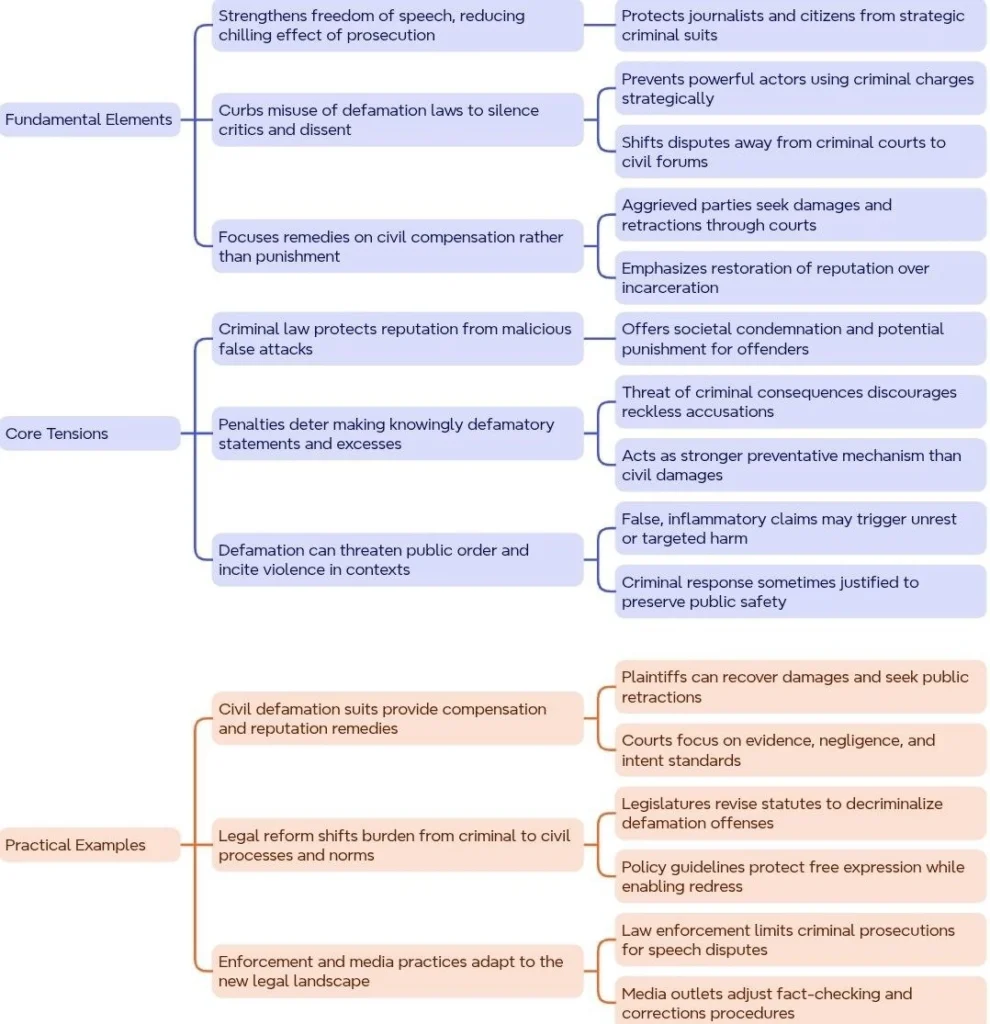Paper: GS – II, Subject: Polity, Topic: Judiciary, Issue: Defamation Law.
Context:
The recent observations by Supreme Court Justice M.M. Sundresh highlight growing concerns over the misuse of criminal defamation laws in India.
Key Takeaways:
- While the Supreme Court had upheld the constitutionality of criminal defamation in the 2016 Subramanian Swamy case, emphasizing protection of reputation as a fundamental right, there is now increasing judicial and public debate on whether such defamation should remain a criminal offence.
- The law is reportedly being used by private individuals and political parties to target opponents and settle scores, raising questions about its relevance and fairness in a democratic society.
How is Defamation Defined under the Indian Law?
- Under Indian law, defamation can be a civil wrong or a criminal offence.
- Civil defamation can be libel (through writing) or slander (spoken word), and is based on tort law (law imposing civil liability).
- It is punishable with financial compensation, and damages are computed based on probabilities.
- In criminal cases, defamation must be proven beyond reasonable doubt. Section 499 of the Indian Penal Code (criminal defamation) says:
- “Whoever, by words or by signs or by visible representations, makes or publishes any imputation concerning any person intending to harm the reputation of such person, is said to defame that person.”
- Criminal defamation can attract a jail term up to two years, with or without fine (Section 500 IPC).
The SC Verdicts on Defamation and the Right to Free Speech:
- Subramanian Swamy vs. Union of India (2016): The SC upheld the constitutionality of IPC Sections 499 and 500. It held that
- The right to reputation is protected under Article 21 (Protection of life and personal liberty) of the Constitution,
- And that criminal defamation is a reasonable restriction on the right to freedom of expression.
- While Article 19(1)(a) of the Constitution protects the right to speech and expression, Article 19(2) allows the state to impose “reasonable restrictions” on this right in the interest of Sovereignty and integrity of India, The security of the State, Friendly relations with Foreign States, Public order, decency or morality or in relation to contempt of court, defamation or incitement to an offence.
- Kaushal Kishore vs Union of India (2017): The SC ruled that no additional restrictions can be imposed on free speech except those under Article 19(2).
- Shreya Singhal vs. Union of India (2015): The SC quashed Section 66A of the IT Act 2000, which had criminalised sending “offensive messages” by means of “a computer resource or a communication device”. This provision was quashed
- In view of the ambiguity in the definition of the term “offensive”, and
- On the ground that the provision was violative of Article 19(1)(a) and not saved under Article 19(2).
Examples:
Rahul Gandhi Defamation Cases:
- In 2025, the Supreme Court stayed criminal defamation proceedings against Rahul Gandhi related to his remarks during the Bharat Jodo Yatra about the Galwan Valley clash and Chinese military actions.
- The remarks led to complaints that he insulted the Indian Army.
- The Supreme Court rebuked Gandhi for making such claims on social media and public forums instead of raising them in Parliament, questioning the credibility of his statements and advising public figures to take care in their remarks.
- Multiple defamation cases filed by private individuals against Rahul Gandhi for comments on various political issues have been stayed by the top court, reflecting judicial caution against misuse of defamation laws to settle political scores.
- Shashi Tharoor Case: Proceedings have been stayed by the Supreme Court in a criminal defamation case against Congress MP Shashi Tharoor about alleged remarks targeting Prime Minister Narendra Modi, showing similar judicial intervention in high-profile defamation cases.
Decriminalizing Defamation: Implications and Arguments:

Way Forward:
- Defamation laws have been enacted to prevent person from maliciously using their right to freedom of speech and expression.
- But given its widespread misuse, India needs to move towards decriminalizing defamation and treat it as a civil wrong for which law already provides for damages.
- Decriminalising it will bring the IPC in accord with Article 19(2), ensuring that the means used to discourage defamation do not end up damping legitimate criticism.
Conclusion:
The Supreme Court judge’s observation highlights a growing concern about the misuse of criminal defamation laws in India. The debate over decriminalization involves balancing the fundamental right to freedom of speech with the need to protect individuals’ reputations. The Supreme Court’s continued scrutiny of defamation cases suggests a potential shift towards a more nuanced approach to this complex issue.
La Excellence IAS Academy, the best IAS coaching in Hyderabad, known for delivering quality content and conceptual clarity for UPSC 2025 preparation.
FOLLOW US ON:
◉ YouTube : https://www.youtube.com/@CivilsPrepTeam
◉ Facebook: https://www.facebook.com/LaExcellenceIAS
◉ Instagram: https://www.instagram.com/laexcellenceiasacademy/
GET IN TOUCH:
Contact us at info@laex.in, https://laex.in/contact-us/
or Call us @ +91 9052 29 2929, +91 9052 99 2929, +91 9154 24 2140
OUR BRANCHES:
Head Office: H No: 1-10-225A, Beside AEVA Fertility Center, Ashok Nagar Extension, VV Giri Nagar, Ashok Nagar, Hyderabad, 500020
Madhapur: Flat no: 301, survey no 58-60, Guttala begumpet Madhapur metro pillar: 1524, Rangareddy Hyderabad, Telangana 500081
Bangalore: Plot No: 99, 2nd floor, 80 Feet Road, Beside Poorvika Mobiles, Chandra Layout, Attiguppe, Near Vijaya Nagara, Bengaluru, 560040
